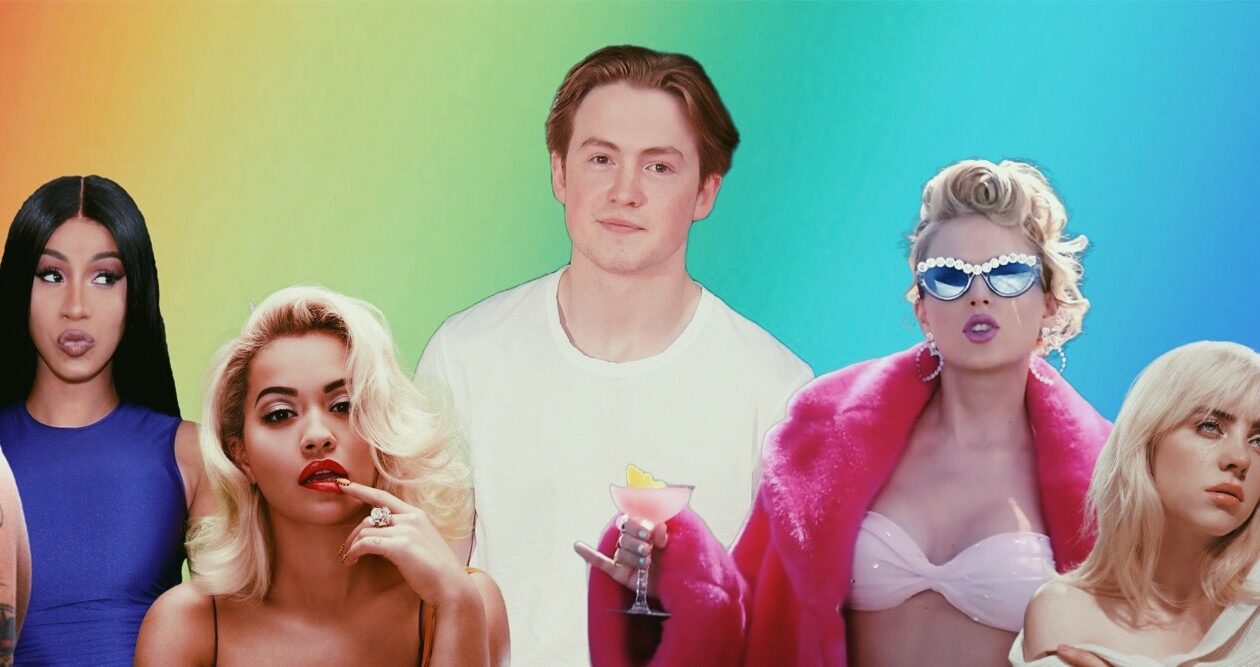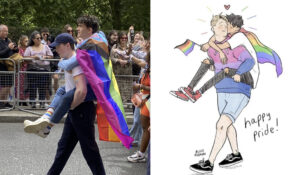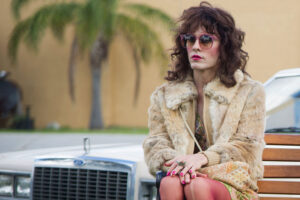
Maybe you’ve caught it before: a hint of romantic tension between two same-sex characters on your favorite TV show; a popular musician subverting conventional expectations with their mode of expression; a couple of puppets looking like they might be a little more than just roommates. From flamboyant pop stars to suggestive Muppets, queer subtext has been fruitfully embedded throughout pop culture for generations. And, while some are considered acceptable instances of queer coding or audacious trailblazing, others can sometimes garner passionate complaints of manipulation.
Generally used as a marketing tactic, queerbaiting is the practice of targeting LGBTQ+ audiences with covert queer messaging and imagery while maintaining ambiguity for other demographics. The term is typically only applied, however, when the product advertised doesn’t actually benefit or represent the queer community (whether authentically or, sometimes, at all). That said, is queerbaiting—at least in the context of today’s understanding—actually as harmful as it’s made out to be? Many could argue that the practice is a way of exploiting an otherwise vulnerable community without showing any kind of support or solidarity. And, in some cases, it has had a rather insidious effect on queer perception in popular media.
Take, for instance, one of the longest-running American TV shows of all time, Supernatural. From 2005 until 2020, dedicated fans followed demon-hunting brothers Sam and Dean Winchester as they navigated a world of ghosts and monsters heavily infused with Christian mythology. Many initially praised the show for the queer undertones seen primarily between Dean and Castiel, an angel introduced at the start of the fourth season. The implications were so palpable, in fact, that fans created a moniker for the pair, referring to them as “Destiel” on social media. And by the end of the series—spoiler alert—their bond becomes canon after Castiel emotionally professes his love for Dean in an attempt to save his life. However, in the span of only a couple of minutes, the showrunners not only fumble but completely obliterate any kind of queer solidarity built over the previous fifteen years.
Immediately following Castiel’s declaration, the character turns into a strange black substance before disappearing into a void (presumably Hell). Fans were understandably upset, not least by the lack of recognition from Dean or any other characters in the subsequent episodes but because, as some pointed out, there was an obvious link to archaic religious views on homosexuality. The way the show handles a queer confession of love ultimately perpetuates queerness as sin, indicating that the mere recognition of such feelings will result in eternal damnation.

When it comes to more prominent accusations of queerbaiting today, however, they are often in response to individual artists and celebrities using queer expression in their work without explicitly disclosing their sexuality. Harry Styles, for example, who chooses not to label his sexual identity, is often accused of queerbaiting by making effeminate style choices, toting the rainbow flag at live shows, and seeking out queer roles like the one he played in Michael Grandage’s My Policeman (2022). And the accusations don’t end there. Artists like Billie Eilish and Rita Ora have faced backlash for suggestive references to queer relationships on social media and in their music, respectively. Taylor Swift has been accused of only supporting the LGBTQ+ community once it became beneficial for album sales. Some have even called out the likes of Cardi B and Lady Gaga for—despite both coming out as bisexual—having never publicly dated somebody of the same sex.

In perhaps one of the more heartbreaking instances, actor Kit Connor—known primarily for playing a bisexual teen in Netflix’s queer hit, Heartstopper—came into a barrage of hateful accusations after a video of him holding hands with a female co-star made its rounds on social media. Fans of the show quickly accused the actor of being disingenuous for playing a queer character as a presumably straight man (because, it would seem, heterosexuality is still considered the default). Many more called him out for queerbaiting after he and Heartstopper costar, Joe Locke, recreated an image from the show’s source material at the London Pride Parade in June of last year. After initially criticizing fans for trying to make assumptions about his identity, Connor eventually took to Twitter in October to state “I’m bi. Congrats for forcing an 18-year-old to out himself” before ultimately deleting his account.
Of course, these accusations beg a very important question: what are the criteria for an individual to freely explore queerness without the threat of being outed or “canceled?” And who has the authority to decide that?
If we’re to lay out what people are claiming to be queerbaiting from these examples, it would seem as though any deviation from the heteronormative standard while being “presumably heterosexual” is dangerous. Apparently, exploring flamboyant fashion as a male, being affectionate with your same-sex friends, and playing queer roles are all off-limits unless you publicly categorize your sexual and gender identity (though sometimes not even then). Except, by this understanding, queerness has been used by prominent figures in popular culture for generations.

The long list includes entertainers from Madonna, Prince, and David Bowie blurring the lines of sex and gender expression to prominent heterosexual actors playing queer characters like Tom Hanks (Philadelphia, 1993), Hilary Swank (Boys Don’t Cry, 1999), Sean Penn (Milk, 2008), and Jared Leto (Dallas Buyers Club, 2013). And, while none of these stars have come out publicly as perhaps anything more than allies (if that), their use of queerness has been celebrated, with each actor listed having won Academy Awards for their respective portrayals of queer characters. Thus, what sets them apart from those previously mentioned is that none of them have been accused of queerbaiting—at least not as broadly or intensely.
So what’s different today? Why isn’t an artist like Harry Styles able to explore queerness in his work? Why isn’t a young actor like Kit Connor able to portray a bisexual character without having to come out himself?
In many ways, it can all be boiled down to one thing: social media. In a culture obsessed with sharing and consuming every nitty-gritty detail of one’s life, it was only a matter of time before speculative discourse reached this level of absurdity. And that’s not to say that invasions of privacy are a new thing in the world of celebrities. Since the advancements of modern media, people have felt entitled to the private lives of those they see on TV, at the movies, or on the covers of magazines. But social media has only worked to amplify this phenomenon. While in the past, famous people have been subject to harassment by paparazzi, fans and critics alike now have seemingly unfettered access to not only harass these celebrities themselves but influence others to do so as well. As a result, the online environment has become a breeding ground for hyper-critical, half-baked takes on otherwise important topics impacting the LGBTQ+ community.
At their best, accusations of queerbaiting rightfully call out harmful tropes and negative representation—at their worst they are nothing more than dangerous and blatant attempts at outing somebody. It would be one thing if these stars were actively working against the queer community or perpetuating archaic views like Supernatural so effortlessly did in their final season. However, in every other case mentioned here (and many others) that simply isn’t happening. In fact, these individuals have shown their support for the queer community, often explicitly, on numerous occasions. While authentic representation is undeniably important, it’s equally important that people be mindful of what actually constitutes queerbaiting. The unfortunate truth is that many who don’t identify with or seek exposure to the community in any way only experience queerness through these artists who perhaps make it more palatable and, in turn, open more pathways leading to further acceptance. Therefore, policing and gatekeeping queer expression from our allies who otherwise uplift and celebrate the LGBTQ+ community shouldn’t be the culture war that it’s so rapidly turning into.
Ultimately, nobody should be made to feel as though they aren’t queer enough to explore queerness and, certainly, nobody should feel forced to publicly come out in order to validate their identity. At its very core, queer expression is meant to be an avenue through which we’re able to break out of the heteronormative restraints perpetuated by nearly every other facet of society. It is a means to an end of pigeon-holed identities and systematic indoctrination—a way of looking at the world through a different lens, beyond socially constructed ideals ingrained in us from the day we’re born. Criticizing those who do explore queerness with such large platforms isn’t going to enact any meaningful change. In the long run, perhaps it would be far more conducive to put that energy toward calling out corporations that absolutely exploit the queer community—they fly the rainbow flag every June before donating millions to anti-LGBTQ+ organizations and politicians. These are the powers that sustain attitudes causing actual harm to the queer community—far more than any pop star is—and there are plenty to choose from.
by Joshua A. Smith

